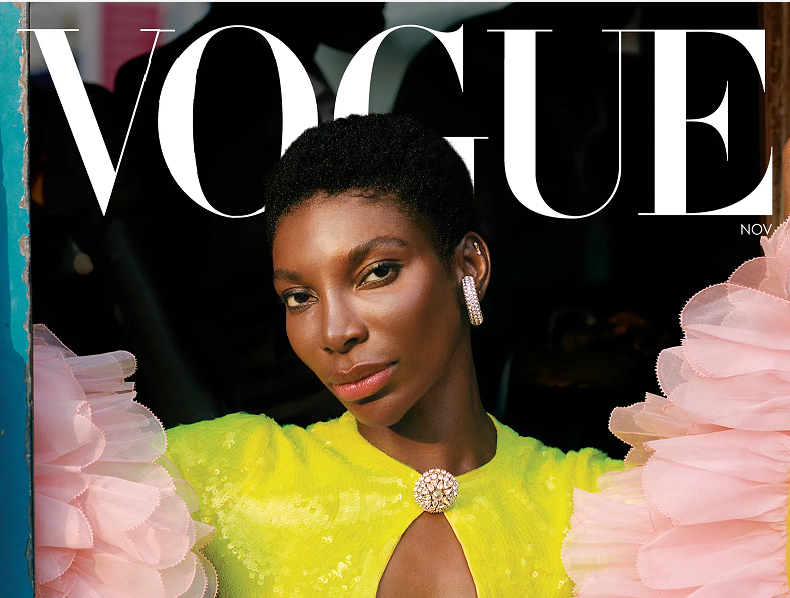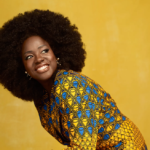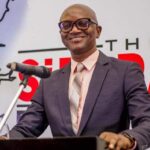Michaela Coel doesn’t like to sit still; she’s a self-described mover, the type to run a half-marathon in the middle of the night for fun. So I’m not all that surprised when the 35-year-old actor-writer-director suggests meeting for a rollerblading session on a Sunday morning in Accra, Ghana’s capital city.
“Totally down for that, sounds like fun!!!” I respond via WhatsApp, adding one too many exclamation points out of apprehension. To be honest, it’s a terrifying idea. The day before, in Accra’s historic Jamestown, I’d witnessed Coel flying through traffic on her skates, her polka-dot Burberry cape flapping wildly behind her, photographer Malick Bodian and his crew in hot pursuit. It was a daredevil stunt suited more to an action movie than a Vogue cover shoot.

Looking every inch the athlete, Coel shows up early for our meet, slender but strong in black running shorts and a sports bra, a purple baseball hat thrown over her closely cropped ’fro. She shows me her skates—white with gigantic lilac wheels—and tells me that big wheels equal great speed.
“The balance is tough, but the enjoyment is max,” she says, grinning. We’re in the parking lot of Decathlon, a sprawling French sports-supply store where she’s persuaded me to buy my first ’blades. The pair I’ve chosen have small wheels—the better to keep me grounded, I think. With guards on my wrists and elbows and kneepads strapped over my baggy jeans, I look like an overgrown teenage boy. Still, safety first—Coel insists on it. “If my skate teacher saw you he’d be like, ‘Where’s the helmet?’ ” she says. For now though, the bucket hat is a fair compromise.
Luckily, Rashaq, one of several skater-boy types on the store’s staff, has agreed to give me a crash course before we take to the streets. As someone who’s only ever used old-school quads, I quickly realize that in-line skating is a totally different beast. Coel compares it to switching from Android to iPhone. And she’s not wrong. I’m struggling to control my limbs and rapidly perspiring in the unrelenting heat. Aside from a couple of trees flanking the entrance of the lot, there’s little shelter from the sun—but Coel’s basically doing pirouettes and has barely broken a sweat. “There’s some sort of slow euphoric feeling that I get when I skate. It’s just my time,” she says, breezing past. “I feel like skaters are never stressed or agitated. They’re on good vibes.”

As a little girl, Coel would skate around the East London council estate where she grew up with her mother and older sister. But it wasn’t until March of last year, while visiting her grandmother in Accra and inspired by a group of kids learning to Rollerblade, that she picked up the sport again. Before ascending to the impressive custom gear she’s wearing today, she bought her first grown-up pair of skates at Decathlon. “This is what happens when you’re not risk-averse,” she deadpans pointing to the scars on her knees, the result of a tumble she took last spring shortly before she flew home to London for the BAFTA awards.
Coel has always been a fast learner, the type to throw herself headfirst into new challenges: As a teenager, she took up Irish dancing, the only Black girl in her London high school’s history to join the team, performing at the talent show the same year. Skating is more than that though—it gives her a mind-body connection, a sense of liberation, especially here in Ghana, she says, where she moves with a particular kind of ease. “I’d been to Africa before—Kenya and Uganda—but when I came here I was really seeing people who looked like me,” says Coel, who first came to the West African country to film Black Earth Rising, Hugo Blick’s searing 2018 drama series about the Rwandan genocide.

“A friend of mine was with me, and he remembers us getting off the plane and me walking around as if I knew where I was going.” On that trip, she traveled the length and breadth of the country, discovering places even her mother and father, who emigrated to London before she was born, didn’t know. “I remember looking at all the kids playing and it hit me, like, Wow, this could’ve been me and I think I would have really enjoyed that,” she says. “Yes, there are a lot of sad things; poverty, unemployment, struggle. There’s also a lot of peace, friendliness. There’s a lack of anxiety.”
Coel has had a lot of practice in setting professional boundaries, in trusting her instincts. To maintain ownership of her work, she famously walked away from a $1 million deal with Netflix in 2017 to make what would become I May Destroy You, the earth-shattering BAFTA- and Emmy Award–winning drama based on her experience of sexual assault. She also severed ties with her talent agency that year, who she claims had pressured her to sign that deal.
It was the BBC who agreed to give her full creative control and rights for the show, with HBO signing on as a co‑producer. “No is the only power you really have in this industry, that’s the only way to carve a path,” says her friend Donald Glover. “Michaela can really do anything she wants, have any role she wants. She means a lot because of the choices she’s made, and I don’t think she takes those choices lightly.”
In November, Coel will appear in Black Panther: Wakanda Forever, the second in Marvel’s wildly popular Afrofuturist series. News of her role immediately lit up the internet, energizing Coel fans and comic book aficionados alike. For the actor, joining the ensemble cast was a wish fulfilled; she’d been one of the many young hopefuls who auditioned for the first Black Panther movie while she was still a student at the Guildhall drama school in London. “I think for a lot of people it was the first time we’d seen some sort of representation on a very mainstream platform about the magic of Africa, the magic of the people, our ancestors,” she says. “Coming here, you do feel something magical.”

By the time Black Panther was released, Coel was making a name for herself with Chewing Gum, the hilarious one-woman play turned BAFTA award–winning sitcom she created that follows the life of Tracey Gordon, an amateurish 20-something on a mission to lose her virginity. She remembers attending the London premiere of Black Panther in a halter-neck dress she’d made out of wax print fabric her mother had brought back from Accra.
“I thought to myself, I’m definitely going in something African,” she says. Unbeknownst to Coel, director Ryan Coogler already had his eye on her, and he noticed how easily she mingled with cast members. “Aneka, the character Michaela plays, is kind of a rebel,” says Coogler. “It made a lot of meta sense with Michaela being someone who is pushing the industry forward and carving out her own space.”
Coel describes her relationship with her mother in loving terms. “I mean, that’s my whole twin,” she says, pulling up a picture of them together outside her mom’s home in London on her phone. The resemblance is uncanny: the wide-set almond-shaped eyes, the symmetrical face, and those extraordinary high cheekbones. I recognize Osborne as the elegantly dressed woman often pictured next to Coel at awards shows. For a long time, Osborne would make the African-print dresses Coel wore on red carpets before she was being dressed by the likes of Balenciaga and Christopher John Rogers.
“Michaela is really good with fabric even though she doesn’t know how to sew herself,” says Osborne, who learned the trade from her own dressmaker mother. “When the dress doesn’t fit, she knows.” She made clothes for Coel when she was a little girl too—as a way to connect to their Ghanaian heritage—and she told stories of her own childhood in the small village where she was raised, and the high school where she met Coel’s father. “I didn’t think my daughters would love Ghana because I grew up there and left,” says Osborne. “But when they went themselves and fell in love with the country, I loved it so much.”
What exactly she’ll choose to do next is something that Coel is not quite ready to talk about. She had begun work on a project on the heels of I May Destroy You in 2020 but ended up setting it aside; something wasn’t gelling. “I couldn’t figure out what my motivations were; money and creating jobs are fine, but that’s not it for me,” says Coel, who remembers being in her office in Central London, surrounded by flowers and cookies sent by her producers, and a feeling of unease overwhelming her.
“There was the assumption that, okay, so now I May Destroy You has happened, you’ve got this window and you have to capitalize on it. And when I hear that, it sounds like the root is fear, because the assumption is the window is going to close. And I don’t feel comfortable making decisions based on fear,” she says. Instead, she did what felt right at the time: She took a break, traveled to Iceland, one of the few places that wasn’t in lockdown, hired a car, found an Airbnb, googled the top 20 scenic places in the country, and visited each one.
There are revelers spilling out onto the sidewalk when we arrive in Accra, and the street is chock-full of local taxicabs. Her cousin has sent word via text that the venue is packed. It might be best for her to go a little incognito. I offer my bucket hat as a disguise and she happily accepts. As we finish touching up our makeup in the car, she shares a thought that’s been on her mind lately: What if the concept for her new show was a woman sitting at the bar? Of course she’d be amazing looking—huge shades, somewhat elusive.
Coel’s mission, as she sees it, is to get to know this woman, find out her story. But she can’t do that unless her intentions are pure. “When I make a show, it’s because I’ve sat at the bar. I’ve looked across at her. I’ve let her know I’m not going anywhere. No contracts or money involved, it’s just me and her. But when that’s not true, she doesn’t come over,” she says. Right now she has a good feeling, her head and heart are aligning, there’s a sense of forward motion. “It feels like she’s slowly turning her face toward me,” she tells me. “She’s slowly opening up.”
















